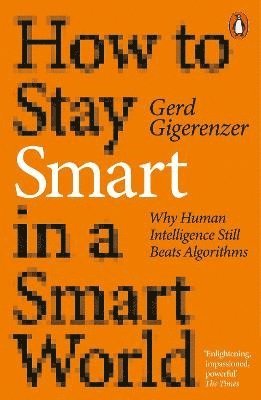Fler böcker inom
- Format
- Häftad (B-format paperback)
- Språk
- Engelska
- Antal sidor
- 320
- Utgivningsdatum
- 2023-03-02
- Förlag
- Penguin Books Ltd
- Dimensioner
- 198 x 129 x 18 mm
- Vikt
- ISBN
- 9780141995045
- 240 g
How to Stay Smart in a Smart World
Why Human Intelligence Still Beats Algorithms
Häftad,
Engelska, 2023-03-02
144
- Skickas från oss inom 2-5 vardagar.
- Fri frakt över 249 kr för privatkunder i Sverige.
Finns även som
Passar bra ihop
De som köpt den här boken har ofta också köpt Careless People av Sarah Wynn-Williams (häftad).
Köp båda 2 för 329 krKundrecensioner
Har du läst boken?
Sätt ditt betyg »
Fler böcker av Gerd Gigerenzer
-
Risk Savvy
Gerd Gigerenzer
-
Intelligence of Intuition
Gerd Gigerenzer, Gerd Gigerenzer
-
Reckoning with Risk
Gerd Gigerenzer
-
Gut Feelings
Gerd Gigerenzer
Övrig information
Gerd Gigerenzer is Director of the Harding Centre for Risk Literacy at the University of Potsdam and partner of Simply Rational: The Institute for Decisions. He is former Director of the Centre for Adaptive Behaviour and Cognition at the Max Planck Institute for Human Development and a former Professor of Psychology at the University of Chicago. He is the author of several books on heuristics and decision-making, including Risk Savvy and Reckoning with Risk.
Du kanske gillar
-
Atomic Habits
James Clear
Trade paperback (UK) -
Shaolin Spirit
Shi Heng Yi
Inbunden



